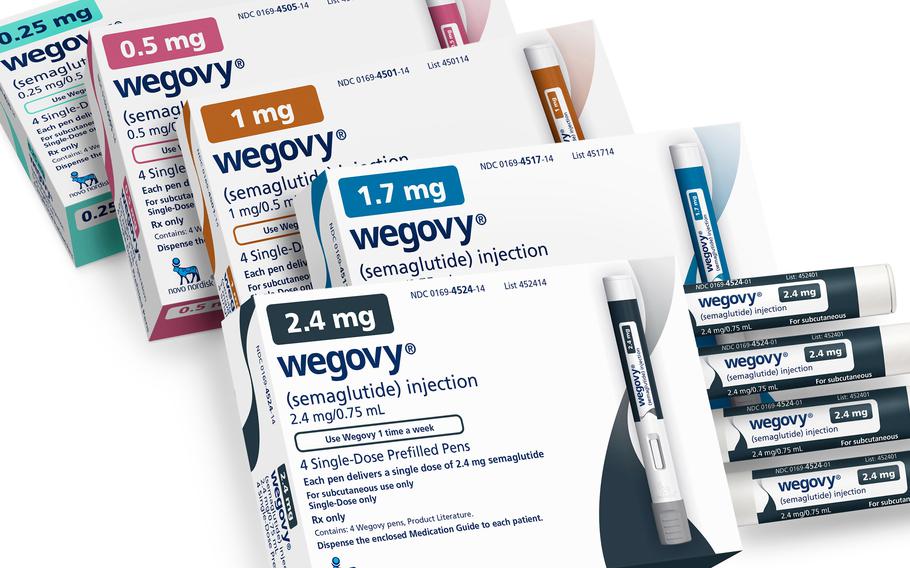
People enrolled in the military health care benefits program Tricare for Life no longer will be eligible for coverage of weight loss drugs, such as Zepbound and Wegovy, starting Aug. 31, the federal health care program for active-duty service members, retirees and their families, announced in a statement on Aug. 5, 2025. (Edward Garibay/U.S. Army)
Some retired service members and others fighting the battle of the bulge will no longer have the cost of several popular weight loss drugs covered by the military health system, Tricare announced this week.
Starting Aug. 31, Tricare for Life beneficiaries won’t receive coverage for Zepbound, Wegovy or other GLP-1 medications, a Tricare statement said Tuesday. Tricare is the federal health care program for active-duty service members, retirees and their families.
The change also applies to Defense Department civilians and other people not covered by Tricare but who are eligible to receive care at military hospitals, according to the statement.
Coverage of weight loss drugs for active-duty service members, retirees and their families enrolled in other health care plans, such as Tricare Prime or Tricare Select, will depend on a person’s condition and certain criteria, Tricare said.
It wasn’t clear exactly what benchmarks people would need to meet for weight loss drug coverage. Enrollment in a Tricare premium plan, prior authorization and a prescription from a network health care provider are among the requirements, according to the statement.
“Otherwise, if you have an approved prior authorization for weight loss drugs, it’s no longer valid,” Tricare said in the statement. “You’ll need to see your provider to discuss your options.”
People affected by the change will get a notice in the mail in the coming weeks, Tricare added.
Use of GLP-1 medications, such as Trulicity, Ozempic, Mounjaro or Victoza, to treat type-2 diabetes still will be covered provided that the treatment is medically necessary and prior authorization is obtained. Some drugs, such as Ozempic, require a copayment.

Tricare for Life beneficiaries will lose coverage of weight loss drugs such as Zepbound and Wegovy, seen here, starting Aug. 31, the military's health insurer said in a statement Aug. 5, 2025. (Novo Nordisk via AP)
It’s unclear how many people will be affected by the change. But a Military Health System report published in January 2024 found that the number of active-duty service members who were prescribed a weight loss drug from January 2018 through June 2023 increased nearly a hundredfold, from 1.2 to 104.4 per 100,000 service members.
Likewise, the number of monthly prescriptions for weight loss drugs filled during the same period rose from seven to 816. Nearly 100% of those prescriptions were for a supply of 90 days or less, according to the report.
The report also said that the U.S. Centers for Disease Control and Prevention estimated in 2022 that increased obesity prevalence in military members costs a potential $1.5 billion annually in obesity-related health care and 658,000 lost workdays.
“The trend in use of weight loss medication in the military should continue to be monitored, as these therapies represent a novel tool to manage obesity in this population,” the military health report stated.
The DHA action comes as civilian health care insurers also grapple with a surge of people seeking the costly drugs amid an obesity epidemic.
In a cost-saving move last month, CVS Caremark stopped covering Zepbound, which is used for chronic weight management in obese or overweight adults, CNN reported July 1.
Zepbound and other weight loss drugs typically used to treat diabetes mimic hormones that regulate hunger and satiety, helping people feel full sooner and eat less, according to a University of Chicago Medicine report in June.
But the cost of those benefits ranges from $700-$800 per month, according to the report.
The researchers also studied the financial impacts if a government health care program, such as Medicare, were to expand its coverage of weight loss drugs for medical treatments beyond diabetes or sleep apnea.
Their projections showed that such an expansion could result in $48 billion in new Medicare spending over 10 years, according to the report.
“Insurers and policymakers aren’t just asking, ‘Is this a good treatment?’” David Kim, a health economist at the University of Chicago, said in the report. “They’re asking, ‘What will this do to our budget?’ And for now, the budget impact is huge.”